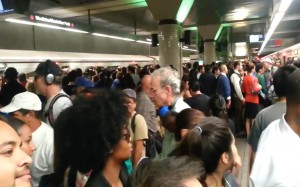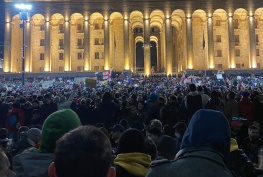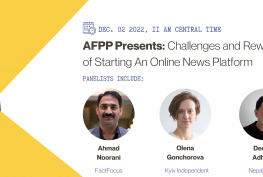By Sherif Tarek
Daniel Pearl Fellow
The Civic Center metro station in Los Angeles downtown was staggeringly crowded that day after work. The infamous crime scene yellow tape sealed one side of the subway platform with a train at a standstill and security personnel scrutinizing the area with detectors.
Only the trains running on the other side were operating, at a much slower pace. Crowds of passengers piled up waiting. It was a suicide attempt that wreaked havoc and troubled the metro system that rush hour evening.
Amid the chaos some lost their tempers. Others took it lightly and laughed about it. Everyone pretty much got used to it, and many started to wave goodbye to each other when a crammed train would finally start to move.
I was working with the LA Times foreign desk but I thought I could do a color story about the incident. Yet I had a change of heart: I was assigned another story; didn’t know whom to call; and was weary after a long day. I thought someone else must’ve already taken it.
But the next day I didn’t find the story in the paper. Only a couple of lines were published in the online version, quoting a witness at the Hollywood/Western Station as saying the man “was dragged 20 yards but survived.”
My initial judgment, which I always second guess when it comes to local stuff since I am a foreigner here, was that the incident deserved a place on the print edition. It had touched thousands of people and turned the fairly comfortable metro system into a disaster for hours.
It might not have been reported on the paper simply because there was more important news that day, or because it happened so frequently that it’s no longer newsworthy.
But while the incident only merited two lines in the LA Times’ online edition, social media picked it up.
When the trains and platforms were overcrowded that day, many people held aloft their mobiles to make videos, later uploaded on YouTube.
Curious readers nowadays, whether in a country suffering suppression or another enjoying a high degree of freedom, have to get the news from different outlets, and this includes social media.
It might be a lot less credible than professional media, but citizen journalism has become undisputedly the prime source for breaking news, and more.
No exclusions on social media. Only millions of people tweeting, sharing and uploading materials, some of which is a lot more serious than just showing the consequences of a failed suicide attempt.
Posts on social media by activists and citizen journalism were instrumental in helping to instigate a number of uprisings in the Middle East a few years ago in what is known as the Arab Spring. For this reason, many blame it for the violence and chaos across the region.
Complete absence of censorship, as well as lack of credibility and professionalism, indeed proved dangerous sometimes, especially in tumultuous areas where rumors could circulate fast and thus further aggravate tensions.
But the fact remains: citizen journalism has caused many people to be more informed about what’s happening in their countries, having counterbalanced repression by divulging what highly censored media, often loyal to the then incumbent governments, didn’t.
Moreover, it has urged — or even forced — mainstream media to expand its boundaries.
Autocratic rulers hate citizen journalism because it’s a tool that cannot be controlled — unlike mainstream media that can be put under pressure in countries where advertising agencies, print and distribution are in the hands of the state, and where journalists can be punished for doing their job.
Twitter was blocked in Turkey March 20, after Prime Minister Recep Tayyip Erdogan pledged to “eradicate” the website following the circulation of leaked recordings that implicated him and members of his inner circle in sweeping corruption allegations before local elections. He also banned Youtube a week later after it was used to host a leaked audio recording of Turkish officials discussing security matters in Syria.
But amid national and worldwide condemnation of the decision, the Turkish government unblocked both sites (Twitter on April 3 and Youtube on 3 June) after the country’s highest court ruled that the ban violated freedom of expression.
Social media is simply an integral part of the current media reality that even dictators have no choice but to accept and deal with the way it is.





